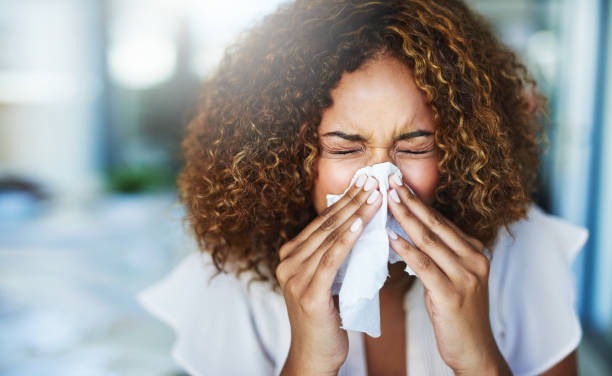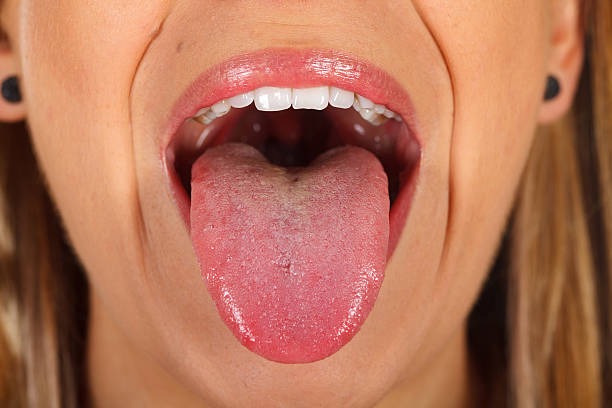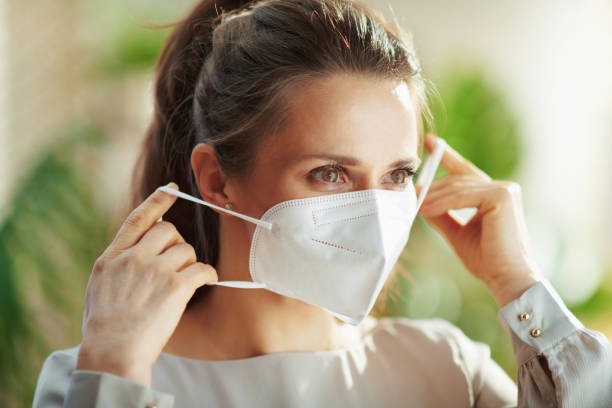Causes of Constant Sneezing and How to Deal With It
[ad_1]

According to Healthline – Persistent sneezing doesn’t just happen when you have a cold or flu. It can also be caused by other conditions such as allergies. Therefore, to be able to cure it, different treatments are needed, according to the initial cause. Here’s what you need to know about persistent sneezing.
Why does sneezing happen?
Sneezing is the body’s way of clearing the nose and airway if a foreign object enters. The nose functions as a regulator of respiratory traffic, where tiny hairs filter out all sorts of foreign objects that enter with the air.
When a foreign object (such as smoke, dust, pollen, dander, bacteria, or viruses) enters the nostrils, the fine hairs will send a signal to the brain to cause an itchy sensation.
The itchy sensation is what then triggers sneezing. Sneezing clears the nasal passages while removing the foreign object.
Causes of persistent sneezing:
Generally, sneezing is not a symptom of a serious health problem. However, this condition can be quite annoying and even interfere with your activities.
For that reason, it’s a good idea to recognise some of the causes of persistent sneezing below:
1. Allergic reaction

If you sneeze frequently even when you don’t have a cold, allergies may be the main cause.
Allergies are conditions caused by your body’s response to foreign organisms. Under normal circumstances, the immune system protects you from harmful foreign objects.
If sneezing is caused by allergies, the immune system will identify foreign objects as a threat, even if they are harmless. As a result, sneezing may occur as the body’s reaction to repel the foreign body.
People with allergies are often sensitive to one or more specific types of objects. The most common triggers for persistent sneezing are dust, mites, pollen and animal dander allergies.
Sometimes, certain types of food allergies can also make a person react by sneezing constantly. Generally, this condition is accompanied by other symptoms such as itchy eyes, runny nose, and a reddish rash on the skin.
Allergic reactions can also be quite severe, called anaphylaxis. When this happens, swelling will occur, making it difficult for a person to breathe. Some foods that often trigger allergies include milk, nuts, eggs, soya, and shelled aquatic animals.
2. Gustatory rhinitis
The next cause of persistent sneezing is gustatory rhinitis. This is a type of non-allergic rhinitis that is triggered by certain types of food.
The symptoms that appear when someone experiences gustatory rhinitis are a runny nose to frequent sneezing. Some types of food that can trigger this reaction are:
Spicy soups
Wasabi
Curry
Salsa
Chilli powder
Chilli sauce
Alcohol.
This type of rhinitis is not always only triggered by spicy or hot foods. It’s just that the possibility of reactions such as a runny nose and sneezing is more common due to spicy foods.
There is no cure for gustatory rhinitis. But don’t worry as this condition does not cause any medical problems.
It’s good for people who often experience this rhinitis to note what foods or spices trigger certain reactions. Then, avoid consuming them so that no symptoms appear.
3. Nasocular reflex
Physical irritants (for example, seeing bright lights or sunlight) can also cause you to sneeze frequently. In the medical world, this condition is called the nasocular reflex.
The nasocular reflex involves a reaction between the eyes and nose. This reflex causes stimulation of the nerves within the mucous membranes of the nose, which then results in sneezing.

4. Infection
Persistent sneezing could be a symptom of an upper respiratory tract infection. This usually happens to people who have a weakened immune system. For example, children, the elderly, people with HIV/AIDS, people undergoing chemotherapy to treat cancer, or people who have received organ transplants.
Infections of the upper respiratory tract can occur due to viruses (usually rhinoviruses and adenoviruses), bacteria or fungi. Infection due to fungal infection is very rare, but that does not mean it is impossible.
Fungal infections can cause rhinitis and persistent sneezing. This type of infection is more common in people with compromised immune systems.
5. Taking certain medications

Certain medications can be a lesser-known cause of sneezing. For example, non-steroidal anti-inflammatory drugs (NSAIDs), nasal decongestants, beta-blockers, antidepressant drugs, tranquillisers, drugs to treat erectile dysfunction, or contraceptive pills.
The side effects of persistent sneezing from these medications will generally stop when the use is stopped. However, always consult your doctor before discontinuing them.
6. Snatiation
In English, snatiation is referred to as snatiation. It is a combination of two words “sneeze” and “satiation” which means fullness. Perhaps not many people realise that eating too much can cause a person to sneeze, which is difficult to control.
This term was first mentioned by two researchers in 1989. They described the case of a 32-year-old man who often sneezed uncontrollably 3-4 times after eating.
Interestingly, his father, grandfather, uncle and siblings had similar symptoms. From there, the case of snatiation continued to be researched. Sneezing occurs when a person eats a very large portion of food. Snatiation occurs as a reflex when the stomach is full and stretched.
Furthermore, snatiation is a genetic condition so it is common for more than one person in a family to experience it. To avoid it, try eating small portions or slowly.
7. Other causes
You may also experience persistent sneezing caused by allergies due to a range of causes other than those mentioned above. Some of these include nasal polyps, neurological conditions, exposure to chlorine in swimming pool water, inhaled tobacco or inhaled cocaine.
How to deal with persistent sneezing:
There are several ways that can be done to stop continuous sneezing, namely:
1. Recognise and avoid triggers
Sneezing is generally an allergic reaction that can be triggered by allergens. The best way to prevent continuous sneezing is to treat and prevent the recurrence of allergies.
To treat allergies, you must first recognise the type of allergen that can trigger the allergic reaction. Each person can have different triggers.
If you already know the trigger of the allergic reaction that causes constant sneezing, then you need to avoid the allergen.
Some of the most common sources of allergies include:
Dust
Spices, such as pepper
Spicy food
Mould
Pollen
Perfume
Flour
Wood dust
Weather.

2. Using antiallergic medicines
There may be times when you find it difficult to avoid allergens, causing you to sneeze constantly. When you sneeze due to allergies, it can usually last two to three times or even more.
To combat this, there are several allergy medications that can be taken. The most common types include antihistamine tablets or pills and steroid nasal sprays.
Over-the-counter antihistamine medications include cetirizine, fexofenadine and loratadine. Glucocorticosteroid intranasal sprays include fluticasone propionate, and triamcinolone acetonide.
If the allergic reaction of persistent sneezing is severe, then you may need medication prescribed by your doctor or allergy shots that can help prevent and reduce allergic reactions.
3. Using nasal sprays at home
You can also try to treat persistent sneezing by using a nasal spray that works to clear your sinuses of germs and debris.
You can buy nasal sprays that contain capsaicin, the chemical compound that gives chillies their pungent taste. This type of nasal spray can help desensitise the nasal tissues and may make sneezing less frequent.
If you are interested in using nasal sprays at home, you can ask your doctor or pharmacist for recommendations before purchasing them. However, keep in mind that there is no good scientific evidence to support this method.

4. Consume foods containing antihistamines
Aside from medications, some foods and drinks also contain nutrients that work as natural antihistamines to reduce allergic reactions and ultimately, resolve persistent sneezing.
One drink you can try is chamomile tea. This tea has an antihistamine effect, so it can reduce the total amount of histamine in the body.
You can also eat foods that contain vitamin C to relieve sneezing.
This is thought to be because vitamin C can act as an antihistamine and boost immunity, thereby lowering the risk of developing allergies as well as illnesses that trigger continuous sneezing.
Some sources of vitamin C are citrus fruits, certain vegetables, and also from supplements.
However, until now there has not been sufficient scientific evidence to support this hypothesis.
5. Using your tongue

There are various ways to deal with persistent sneezing, some of which may sound like myths or folk tales. But this has been widely practised and not a few who feel the benefits.
One unique way that is claimed to be effective in stopping persistent sneezing is by using the tongue. You can tickle the palate with your tongue for 5 to 10 seconds to get rid of the urge to sneeze.
Another method using the tongue is to press your tongue hard against your two front teeth until the urge to sneeze passes.
How to prevent persistent sneezing:
The symptoms of frequent sneezing usually do not appear out of nowhere. You may also experience other symptoms, such as fatigue, lack of concentration, nasal irritation, runny nose, red eyes, and so on.
Therefore, it is important to prevent persistent sneezing. You can avoid it by taking the following steps:
1. Keep your home clean from dust and mites

Keeping your home clean from dust and mites is one way to reduce the symptoms of persistent sneezing.
Routine cleaning of the house can prevent the accumulation of dust and the appearance of mites. Use a vacuum cleaner or a damp cloth to clean furniture and furniture.
Reducing the use of carpets can also minimise the chances of mites breeding in your home.
2. Don’t keep pets if you have allergy to animals
If you have an allergy to animal dander, you should not keep furry animals. For example, dogs, cats, hamsters, and more.
Alternatively, you can switch to keeping aquatic or hairless animals. For example, fish or iguanas.
If you already have a furry pet, it is recommended that you bathe and trim their fur regularly. This step aims to keep the animal clean while preventing constant sneezing.
Don’t forget to wash your hands after touching your pet.
3. Use a mask

Use a mask when you are outdoors. It can block you from cigarette smoke, vehicle fumes, and other air pollution.
This step will also protect you from viruses and bacteria that fly with the saliva and snot of respiratory infection sufferers who sneeze or cough around you.
4. Maintain personal hygiene
For those of you who often sneeze, make sure to always maintain personal hygiene. This will protect you and those around you.
For example, cover your nose and mouth with a tissue when you sneeze. If a tissue is not available, you can cover your nose and mouth with the back of your hand or upper arm instead of your palm.
Afterwards, wash your hands immediately with soap and clean water before touching anything to stop the spread of germs and disease.
Note:
Sneezing is not a symptom of a serious health condition. Therefore, you don’t need to worry about it if you sneeze occasionally.
However, if the sneezing is persistent and does not subside even though you have reduced the symptoms and risk of exposure to allergies and taken medication, you should see a doctor.
A medical examination is especially necessary if the condition of frequent sneezing is accompanied by other serious symptoms. This is because there may be certain medical disorders behind your persistent sneezing.
Content created and supplied by: Trendyhealth (via Opera
News )
Opera News is a free to use platform and the views and opinions expressed herein are solely those of the author and do not represent, reflect or express the views of Opera News. Any/all written content and images displayed are provided by the blogger/author, appear herein as submitted by the blogger/author and are unedited by Opera News. Opera News does not consent to nor does it condone the posting of any content that violates the rights (including the copyrights) of any third party, nor content that may malign, inter alia, any religion, ethnic group, organization, gender, company, or individual. Opera News furthermore does not condone the use of our platform for the purposes encouraging/endorsing hate speech, violation of human rights and/or utterances of a defamatory nature. If the content contained herein violates any of your rights, including those of copyright, and/or violates any the above mentioned factors, you are requested to immediately notify us using via the following email address operanews-external(at)opera.com and/or report the article using the available reporting functionality built into our Platform
See More
[ad_2]


